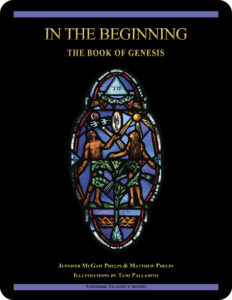 In the Beginning:
In the Beginning:
The Book of Genesis
Lesson 20 The Story of Dinah
the book of Genesis 34:1–31
Revised Standard Version Catholic Edition (RSVCE)*
New American Bible Revised Edition (NABRE)*
Catechism of the Catholic Church
ex libris (in our library)
cross references in the book of Genesis
next lesson: The Birth of Benjamin & the Death of Rachel
This material coordinates with Lesson 20 on pages 111–114 in the study book In the Beginning: The Book of Genesis.
“And God saw everything that he had made, and behold, it was very good. And there was evening and there was morning, a sixth day. Thus the heavens and the earth were finished, and all the host of them. And on the seventh day God finished his work which he had done, and he rested on the seventh day from all his work which he had done.”—the book of Genesis 1:31—2:2
welcome to our in-depth study of the book of Genesis
We invite interested groups and individuals to check out the sample first lesson from this 28-lesson  Turning to God’s Word Catholic Bible study.
Turning to God’s Word Catholic Bible study.  These online study pages link to our free lesson video overviews as well as to a list of cross references in the biblical text. Other study aids include maps, charts, illustrations, additional commentary, and prayers based on the primary Scripture in each lesson. In the Beginning: The Book of Genesis has been granted an imprimatur and can be purchased from our website shop. If you have a Bible-study question or comment, click on one of the “ask us your question” or “what do you think” buttons on any online study page.
These online study pages link to our free lesson video overviews as well as to a list of cross references in the biblical text. Other study aids include maps, charts, illustrations, additional commentary, and prayers based on the primary Scripture in each lesson. In the Beginning: The Book of Genesis has been granted an imprimatur and can be purchased from our website shop. If you have a Bible-study question or comment, click on one of the “ask us your question” or “what do you think” buttons on any online study page.
open with prayer
It’s always wise to begin any Bible study with prayer, whether reading the Scriptures alone or meeting with others in a discussion study group. You can pray using your own words or use one of the opening prayers on our website. We especially like the following:
Lord Jesus, you promised to send your Holy Spirit
to teach us all things.
As we read and study your word today,
allow it to touch our hearts and change our lives. Amen.
let’s review—the book of Genesis 32:1—33:20
In Lesson 19 Jacob Wrestles at Peniel, as Jacob journeys back to the land of Canaan, he’s met along his way by an army of angels. After that he sends a message to let his brother Esau know that he’s returning, and he prays for God to deliver him from any harm at his brother’s hand. After preparing a generous present for his brother and sending his wives, children, and possessions across the Jabbok, he remains on the other side where he wrestles all night with a mysterious stranger. In the morning, the stranger blesses him but refuses to disclose his name. Jacob calls the place Peniel, to reflect that he’d seen God face to face there and not died. His meeting with Esau goes well, but Jacob refuses Esau’s offer that they travel together—as well as Esau’s offer to leave some of his men with Jacob. The two part, with Esau going south to Seir, another name for Edom, and Jacob traveling first to Succoth, where he builds a house, and then on to Shechem, where he purchases some land.
trouble in the land of Canaan
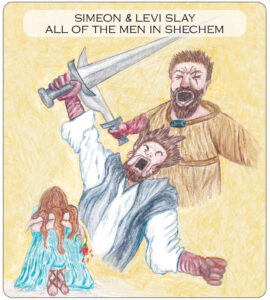 Many Catholics are unfamiliar with the disturbing story of the rape of Dinah and the horrible way that her brothers avenge her honor. These events rarely are discussed in a liturgical setting or in regular catechesis. The thirty-fourth chapter in the book of Genesis presents the sons of Jacob in an unflattering light, although in fairness, the Hivites living in Shechem fare only slightly better. The sons of Jacob are obsessed by their unbridled desire for vengeance, while Hamor’s son Shechem is ruled by lust. The biblical text raises unsettling questions about how these emotions are handled. Click on the illustration (right) to enlarge it. The original illustration is on page 113 in the study book In the Beginning: The Book of Genesis.
Many Catholics are unfamiliar with the disturbing story of the rape of Dinah and the horrible way that her brothers avenge her honor. These events rarely are discussed in a liturgical setting or in regular catechesis. The thirty-fourth chapter in the book of Genesis presents the sons of Jacob in an unflattering light, although in fairness, the Hivites living in Shechem fare only slightly better. The sons of Jacob are obsessed by their unbridled desire for vengeance, while Hamor’s son Shechem is ruled by lust. The biblical text raises unsettling questions about how these emotions are handled. Click on the illustration (right) to enlarge it. The original illustration is on page 113 in the study book In the Beginning: The Book of Genesis.
 two of Jacob’s sons engage in serious deceit (9:07)
two of Jacob’s sons engage in serious deceit (9:07)
In the video overview for this lesson, Turning to God’s Word author Matthew Phelps  discusses one of the raciest accounts in the Old Testament, which begins with a conflict surrounding the local prince Shechem’s desire to marry Jacob’s daughter Dinah. It’s interesting to think about how the marriage negotiations might have gone had not Shechem first raped Dinah before deciding he wanted her to be his wife. After the local men of the area agree to be circumcised, Jacob’s sons Simeon and Levi rashly take it upon themselves to murder them in retaliation for the rape of their sister. When Jacob learns what his sons have done he’s displeased. Simeon and Levi’s
discusses one of the raciest accounts in the Old Testament, which begins with a conflict surrounding the local prince Shechem’s desire to marry Jacob’s daughter Dinah. It’s interesting to think about how the marriage negotiations might have gone had not Shechem first raped Dinah before deciding he wanted her to be his wife. After the local men of the area agree to be circumcised, Jacob’s sons Simeon and Levi rashly take it upon themselves to murder them in retaliation for the rape of their sister. When Jacob learns what his sons have done he’s displeased. Simeon and Levi’s  actions have far-reaching consequences moving forward in salvation history. The videos for this study are being redone and will be posted as they become available. The original videos for Lessons 4 through 28 will remain accessible until then.
actions have far-reaching consequences moving forward in salvation history. The videos for this study are being redone and will be posted as they become available. The original videos for Lessons 4 through 28 will remain accessible until then.
The Scripture ranges for the videos being redone to accompany this Catholic Bible study from Turning to God’s Word will match the Scripture ranges for the sets of questions in the study book In the Beginning: The Book of Genesis. Viewers will be able to follow along as author Matthew Phelps discusses Lesson 20, “The Story of Dinah,” on pages 110–114 in the study book.
an often overlooked connection to the New Testament
The fourth chapter in the Gospel According to John contains one of the most important conversations with Jesus recorded in the New Testament. The person with whom Jesus is speaking is a Samaritan woman, and this passage forms the Gospel reading for the first scrutiny undergone by adult catechumens seeking to enter the Church. While many scholars have mentioned the link between wells and betrothals when commenting on Jesus’ encounter with the woman at the well, few mention the Old Testament tragedy that occurred at Shechem to derail the betrothal of Dinah to a Hivite prince. How do you think that the suggestion of a betrothal and historic ideas of rape and deceit might figure into what transpired between Jesus and the woman at the  well in the fourth chapter in the Gospel According to John? Consider what’s the most important point that Jesus is trying to make in his conversation with the woman at Shechem? Learn more about the meeting between Jesus and the woman at the well in Lesson 5 There Came a Woman of Samaria in the Turning to God’s Word Catholic Bible study The Gospel According to John: An Encounter with Grace & Truth.
well in the fourth chapter in the Gospel According to John? Consider what’s the most important point that Jesus is trying to make in his conversation with the woman at Shechem? Learn more about the meeting between Jesus and the woman at the well in Lesson 5 There Came a Woman of Samaria in the Turning to God’s Word Catholic Bible study The Gospel According to John: An Encounter with Grace & Truth.
 vengeance—you could look it up in our archives
vengeance—you could look it up in our archives
The first account of vengeance encountered in the book of Genesis involves Cain and Abel, but vengeance also permeates the story of Dinah. To learn more about the word “vengeance,” read Lost in Translation, an online column in which Turning to God’s Word author Matthew Phelps helps readers connect with ideas expressed in the original languages of the Scriptures. New Lost in Translation entries are posted on Mondays, and past entries are archived on our website. Contact us if you’d like to receive Lost in Translation by email every week.
read the Catechism—let’s look at the definition of lust
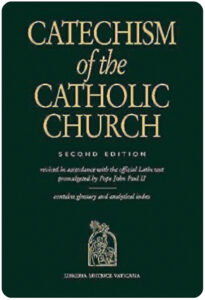 It’s difficult to guess how Shechem’s proposal to marry Dinah might have gone had he first not been carried away by lust and raped her. The Church offers a definition of lust in paragraph 2351 in the Catechism of the Catholic Church.
It’s difficult to guess how Shechem’s proposal to marry Dinah might have gone had he first not been carried away by lust and raped her. The Church offers a definition of lust in paragraph 2351 in the Catechism of the Catholic Church.
2351 Lust is disordered desire for or inordinate enjoyment of sexual pleasure. Sexual pleasure is morally disordered when sought for itself, isolated from its procreative and unitive purposes.
WHAT DO YOU THINK are the motivating forces in the story of Dinah?
The motivations of Shechem and of Dinah’s brothers already have been described as lust and vengeance, respectively.
? There are several other key players involved in this story. Can you name them and describe the role that each plays in this account?
 ? The book of Genesis 34:3 records that Shechem’s soul is drawn to Dinah. Consider what point the author of the book of Genesis might be trying to make about Shechem’s feelings for Dinah.
? The book of Genesis 34:3 records that Shechem’s soul is drawn to Dinah. Consider what point the author of the book of Genesis might be trying to make about Shechem’s feelings for Dinah.
? What do you think is motivating Shechem’s father Hamor to seek to arrange a marriage for his son with people who have a different lifestyle and practice a different religion than Shechem and his family?
? What do you think is motivating the Hivite men of Shechem to agree to be circumcised?
? Why do you think it is that Jacob doesn’t appear to be involved in the arrangements for Dinah to marry Shechem?
? Consider what might be implied in the book of Genesis 34:17 when Dinah’s brothers refer to her as their daughter?
? Why do you think it is that there’s no mention in the biblical text of how Dinah feels about Shechem or about her arranged marriage?
? In what way is the behavior of Jacob’s sons an insult to God’s covenant with Abraham?
t he best Catholic commentary about Scripture
he best Catholic commentary about Scripture
To find out more about how Church teaching is supported by Scripture passages in In the Beginning: The Book of Genesis, check out the Index of Citations in the Catechism of the Catholic Church. Links (Revised Standard Version Catholic Edition [RSVCE*]) to the primary Scripture passages in the lesson and relevant paragraphs in the Catechism are provided here. Not every passage in the biblical text for this Catholic study is referenced in a Catechism paragraph, however, including the passage in this lesson from the book of Genesis 34:1–31.
to learn more, read more Scripture
If you’re having difficulty with a particular passage of Scripture, it can be helpful to read the relevant  cross references—but looking these up can take time. To make that easier, we’ve compiled the cross references from the Revised Standard Version Second Catholic Edition (RSV2CE)—the translation that we reprint in our study books. That list can be found at the top of every online study page, and it includes links to cross references in the primary biblical text for In the Beginning: The Book of Genesis.
cross references—but looking these up can take time. To make that easier, we’ve compiled the cross references from the Revised Standard Version Second Catholic Edition (RSV2CE)—the translation that we reprint in our study books. That list can be found at the top of every online study page, and it includes links to cross references in the primary biblical text for In the Beginning: The Book of Genesis.
don’t forget about our indexes & extra online material

 If you’re trying to locate information about a specific Scripture passage, you can look it up in the index at the back of the study book or sample lesson. If you want to find a particular commentary, you can look up its title in the topics index. To learn more about another book of the Bible for which there’s a Turning to God’s Word study, visit the online study directories to read the commentaries and watch any accompanying videos. Finally, if you have a question or would like to make a comment about any of our studies, you can use one of the “ask us your question” or “what do you think” buttons to email our authors.
If you’re trying to locate information about a specific Scripture passage, you can look it up in the index at the back of the study book or sample lesson. If you want to find a particular commentary, you can look up its title in the topics index. To learn more about another book of the Bible for which there’s a Turning to God’s Word study, visit the online study directories to read the commentaries and watch any accompanying videos. Finally, if you have a question or would like to make a comment about any of our studies, you can use one of the “ask us your question” or “what do you think” buttons to email our authors.
ex libris—Church documents & books about religious topics
Link to magisterial documents referred to in our Bible studies at ex libris—magisterial documents.  This listing includes significant recent encyclicals as well as a number of historical Church documents. Recommended books related to Scripture study can be found at ex libris—main bookshelf.
This listing includes significant recent encyclicals as well as a number of historical Church documents. Recommended books related to Scripture study can be found at ex libris—main bookshelf.
wondering how to pronounce some of these words?
The following link is to a reading from the New International Version (NIV) Bible. To listen, open the link and click on the audio icon above the printed text. Although not taken from the translations used in our study materials, the NIV reading provides an audio guide to pronunciation of words in this lesson’s primary biblical text. A close online version of the translation of the Bible used in Catholic liturgy in the United States as well as an audio guide for daily Mass readings for the current month can be found on the website of the United States Conference of Catholic Bishops (USCCB).
the book of Genesis 34:1–31 (NIV)
 close with Bible-based prayer related to this lesson
close with Bible-based prayer related to this lesson
Many of our Catholic study groups like to conclude their discussions with a prayer based on the scriptural focus of their lesson, and some participants include Scripture-specific prayer in their individual study. If you’re uncomfortable composing your own Bible-based prayers, you can follow our four easy steps. If you prefer, you can use the following prayer based on this lesson’s text from the book of Genesis.
O God, you created men and women with free will
and the ability to choose between good and bad behavior.
Teach us to recognize the evil that’s made possible
whenever we make selfish choices,
and help us always to choose the good.
We ask this in the name of Jesus Christ,
whose love for us enabled him to make the difficult choice to die
in order that we might be given the opportunity to live. Amen.
Lesson 21 The Birth of Benjamin & the Death of Rachel—the book of Genesis 35:1—36:43
Lesson 19 Jacob Wrestles at Peniel—the book of Genesis 32:1–33:20*
you also may like our study of Scripture & the Rosary (digital only)
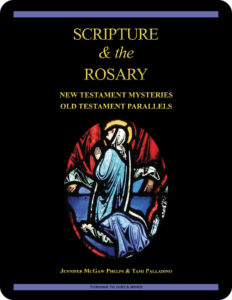 Scripture & the Rosary: New Testament Mysteries, Old Testament Parallels, a 26-lesson Catholic Bible study with an imprimatur, looks at the biblical foundations of the Rosary. The study includes lessons on Pope St. John Paul II’s Rosarium Virginis Mariae (Rosary of the Virgin Mary), the Apostles’ Creed, and the Luminous Mysteries as well as the original 15 Mysteries of the Rosary. Color photographs of stained glass windows depict key scenes in the lives of Jesus and Mary. Free digital lessons rotate throughout the year on our website.
Scripture & the Rosary: New Testament Mysteries, Old Testament Parallels, a 26-lesson Catholic Bible study with an imprimatur, looks at the biblical foundations of the Rosary. The study includes lessons on Pope St. John Paul II’s Rosarium Virginis Mariae (Rosary of the Virgin Mary), the Apostles’ Creed, and the Luminous Mysteries as well as the original 15 Mysteries of the Rosary. Color photographs of stained glass windows depict key scenes in the lives of Jesus and Mary. Free digital lessons rotate throughout the year on our website.
start a Turning to God’s Word Bible study
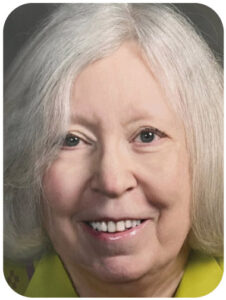 Thank you for your interest in our study In the Beginning: The Book of Genesis.
Thank you for your interest in our study In the Beginning: The Book of Genesis.  Information about beginning a Turning to God’s Word Catholic Bible study can be found at start a Bible study. Tami, Matthew, and I are available to answer questions and offer support. Contact us if you’d like to start a Turning to God’s Word study or have your schedule listed with other TtGW study groups on our website. —Jennifer
Information about beginning a Turning to God’s Word Catholic Bible study can be found at start a Bible study. Tami, Matthew, and I are available to answer questions and offer support. Contact us if you’d like to start a Turning to God’s Word study or have your schedule listed with other TtGW study groups on our website. —Jennifer
*There are seven deuterocanonical books in the Old Testament—the Books of Tobit, Judith, Wisdom, Sirach, Baruch, and First and Second Maccabees, as well as some passages in the Books of Esther and Daniel. Protestants usually refer to these works as “apocryphal,” a word that means “outside the (Protestant) canon” because they’re excluded from most Protestant Bibles. The word “deuterocanonical” means “second canon”; Catholics use that word to refer to any section of the Catholic Old Testament for which there are no extant, or existing, Hebrew manuscripts. All of the deuterocanonical books appear in the Septuagint, the earliest remaining versions of which date to the 1st century B.C. This Greek translation of the Old Testament was in common use by Jews at the time of Jesus—but the same books aren’t found in existing Hebrew manuscripts, which aren’t as old as the oldest version of the Septuagint. Learn more by reading How Do Catholic & Protestant Bibles Differ?
Turning to God’s Word printed Bible studies use the 2006 Revised Standard Version Second Catholic Edition (RSV2CE) translation for all Scripture references except those to the Psalms, which are taken from The Abbey Psalms and Canticles, prepared by the Benedictine monks of Conception Abbey and published in 2020 by the United States Conference of Catholic Bishops (USCCB). All Scripture links for the online study pages for In the Beginning: The Book of Genesis are to the 1966 Revised Standard Version Catholic Edition (RSVCE) translation. The New International Version (NIV) audio recordings follow the same chapter and verse numbering as the RSV Catholic translations, but the NIV translation doesn’t include the deuterocanonical books and passages.
The 1966 RSVCE uses archaic pronouns and verb forms such as “thee,” “thou,” “didst” in the Psalms and in direct quotations attributed to God. The 2006 RSV2CE replaces those with more accessible English. The few significant translation changes in the RSV2CE include rendering almah as “virgin” in the Book of Isaiah 7:14 and restoring the term “begotten” in the Gospel According to John 3:16.
Numbering varies for some passages in this Bible study. Turning to God’s Word studies (print and digital) follow the numbering in the Revised Standard Version Catholic translations (RSV2CE and RSVCE). Discrepancies in the New American Bible Revised Edition (NABRE) are noted in the Index of Scripture Citations in the study book and the online sample.
 You can learn more about the Psalms by viewing a sample lesson from the Turning to God’s Word Catholic Bible study Sing a New Psalm: Communicating with God Through the Prayers of the Church—Volume I: Lauds & Vespers. The second part of that study, Sing a New Psalm: Communicating with God Through the Prayers of the Church—Volume II: Vigils, Day Prayer & Compline, is scheduled for publication in 2025. Some verse numbers may vary in different translations of the Psalms
You can learn more about the Psalms by viewing a sample lesson from the Turning to God’s Word Catholic Bible study Sing a New Psalm: Communicating with God Through the Prayers of the Church—Volume I: Lauds & Vespers. The second part of that study, Sing a New Psalm: Communicating with God Through the Prayers of the Church—Volume II: Vigils, Day Prayer & Compline, is scheduled for publication in 2025. Some verse numbers may vary in different translations of the Psalms
